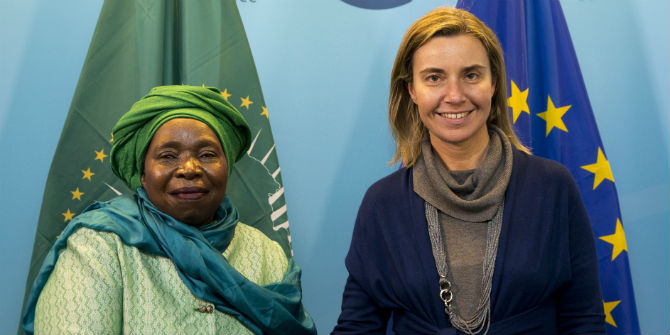 Britain is a major contributor to the EU aid budget. Sophia Price (Leeds Beckett University) discusses how Britain might choose to spend its aid budget once its obligations to the EU – a key element of the ‘divorce bill’ – are fulfilled. Will it continue to direct money towards countries with which it hopes to forge stronger trading relationships? Can it maintain the leverage it enjoyed as an important player in the Union? Will it face calls to step in when the EU cuts back its commitments, particularly in regions with historic ties to Britain, like the Caribbean? A drop in the value of sterling would also effectively cut the UK’s contributions.
Britain is a major contributor to the EU aid budget. Sophia Price (Leeds Beckett University) discusses how Britain might choose to spend its aid budget once its obligations to the EU – a key element of the ‘divorce bill’ – are fulfilled. Will it continue to direct money towards countries with which it hopes to forge stronger trading relationships? Can it maintain the leverage it enjoyed as an important player in the Union? Will it face calls to step in when the EU cuts back its commitments, particularly in regions with historic ties to Britain, like the Caribbean? A drop in the value of sterling would also effectively cut the UK’s contributions.
Securing an agreement on the Brexit ‘divorce bill’ remains a stumbling block in the negotiations between the UK and EU. The size of this financial contribution rests on an assessment of both current and future obligations. It is an area that has shown little evidence of progression in the negotiations, and is a barrier to moving onto post-Brexit trade arrangements.
There have been widely divergent assessments of the likely scale of the ‘divorce bill’. While the EU has not explicitly set a figure, it has published the methodology for its calculation. The UK has been less clear in relation to quantifying the actual sum, although in her Florence speech on 22 September Theresa May said that “the UK will honour commitments we have made during the period of our membership.”

A significant proportion of the UK’s financial commitments to the EU is in the form of the development aid. The EU is the world’s largest donor, providing half of all international aid, which, coupled with international trade provisions, underpins the operation of its development cooperation relations. These span all areas of the global south, including Latin America, Central Asia and the Gulf. The widest and longest standing of the EU’s development/trade relations with developing countries is with the 79 African, Caribbean and Pacific states that form the ‘ACP’ Group. The EU-ACP relationship has its own funding mechanism, the European Development Fund (EDF), which sits outside of the EU budget.
UK contributions to EU aid are significant, at €4.5bn (2014-2020). It is the third largest contributor to the EDF (after Germany and France) and provides approximately 15% of the total EDF funding. UK EDF contributions are next due to be paid in 2018, highlighting the importance of both the calculation and timing of the divorce bill for the UK, the EU and states across the global south.
While the UK’s role in the EU’s development relations has not been at the forefront of the discussions about the divorce bill, a number of the debates surrounding the referendum have alluded – directly – and indirectly – to them. Most notable was the argument made by Boris Johnson that through EU membership the UK had ‘betrayed’ its former colonies and partners in the Commonwealth, and that Brexit would provide an opportunity to re-engage with these relationships under the banner of ‘Global Britain’.
Various commentators have argued that this ‘betrayal’ is a myth (see Murray- Evans, and Price), and that through the EU that the UK has been able to continue to play and even extend its global role. By joining the EU in 1973 the UK was able to collectivise its obligations to its former colonies, particularly those in Africa and the Caribbean, through the EU- ACP relationship. Moreover, this relationship extended the scope of UK relations with states in the global south, linking the UK to the former colonies of other member states, particularly France.
It is through EU membership that the UK has been able to expand the reach of its external relations to areas where its presence was previously limited or declining. By extending reach – and sharing prior obligations – this has also provided good value for money in UK aid spending (Watkins 2016). The UK government recognised this, stating in 2013 that the “reach and magnitude of EU financial instruments” outweighs those the UK could bring to bear bilaterally and that this has allowed the UK to maximise the use of its (scarce) resources, particularly in times of austerity.
The UK has also played a leading role in EU development cooperation relations. It has been able to align EU and broader agendas with its own objectives, for example through linking the Department for International Development (DfID) and the EU with the Millennium Development Goals and now the 2015 Sustainable Development Goals. The UK’s ability to leverage EU aid to enhance its own objectives can be seen through the inclusion of various UK preferences for EU aid policy. According to Andrew Sherriff, head of the European External Action Programme:
“The UK has had an influence on the EU’s focus and expertise on the 0.7% target for aid, the SDGs, the value for money and results agenda, differentiation in EU aid to focus more on least development countries and fragile states” (ECPDM 2016).
The perception of UK influence is also one held by UK policy makers themselves, who consider themselves ‘determinant actors’ in aid allocation and with the EU acting as a ‘a catalyst for their own aid’ (Olivie and Perez). Smith (2016) argues that through the coordination with the EU the UK has been able to ‘punch above its weight’ and that outside the EU it will struggle to have the same level of global reach and influence.
Brexit has been presented as an opportunity to forge a new role in the world, as a ‘Truly Global Britain’. This agenda is central to DFID’s 2017 Economic Development Strategy: Prosperity, Poverty and Meeting Global Challenges which says “Britain is redefining and reinforcing its place in the world’. However, EU membership has enabled the UK to play a leadership role both in the formulation and operation of regional and global development policy and practice. Rather than enhancing the UK’s global role, Brexit threatens to undermine it.
While May’s confirmation that her government intends to meet its existing EU financial commitments suggests that the UK will continue to contribute to EU development funding until it leaves, what happens after Brexit remains open to question. The EU will have lost one of the largest contributors to its development funding, and will be faced with either trying to fill the gap or reducing its commitments. Given that many EU member states have been cutting their aid budgets, it seems optimistic to hope that the EU27 will be willing to increase their commitments to compensate for UK withdrawal. This might be a concern for particular areas, such as the Caribbean states, whose interests have traditionally been championed by the UK. Moreover, the shape of EU development policy is likely to change without the UK’s input.
If the UK decides to continue with its current aid spending commitment of 0.7% of GNI, it would imply that funds would return to the control of national government. The UK could either focus this funding on bilateral or multilateral partners. After the 2011 Bilateral Aid Review the number of bilateral aid partners fell from 78 to just 28 by 2012, and includes low-middle income and upper-middle income countries as well as least developed countries (UK Aid Network 2017). Although Brexit might disrupt this trend, there would be high costs associated with attempts to reach the same number of countries as the UK does through the EU. While it may be possible to form new multilateral partnerships, it is questionable whether they would have the same scale, scope and influence as the EU afforded.
Even if the level of aid contributions is maintained, Brexit could affect their scale if – as economists predict – an exit shock leads to a contraction in GNI and/or there is further devaluation of sterling.
An allied trend in UK aid policy has been the pursuit of ‘mutual benefits’ and the promotion of UK business interests abroad. Priti Patel has said that aid reclaimed from the EU would be spent in ‘the national interest’ for ‘prosperity Britain post- Brexit, on trade and economic development’. This confirms a UK Aid Network statement that ‘UK aid seems to be driven by UK priorities less clearly aligned to partner countries’ development strategies; aid remains ‘informally’ tied with most contracts going to UK-based firms”. Indeed, rather than creating a ‘truly global UK’, Brexit might mark a turn to a more parochial set of relationships based on the pursuit of narrow interests over the more general needs of ‘global development’.
In sum, there is a significant danger that Brexit will deliver the exact opposite of ‘Global Britain’ and significantly narrow and reduce UK influence in the world while reducing aid to the poorest parts of the global population.
This post represents the views of the author and not those of the Brexit blog, nor the LSE.







The Daily Express has for a long time,as well as advocating Brexit, been calling for Foreign Aid to be reduced from the UN target figure of 0.7% of GNI. “Why not spend this money at home, rather than subsidising rich Indians?” is a typical comment. This would seem to reinforce the parochialism arguments in the post above.
Hopefully we will see sense and slash the aid budget and put the money into social care, NHS and other services here.
Hopefully we will see sense and slash the aid budget and put the money into social care, NHS and other services here.